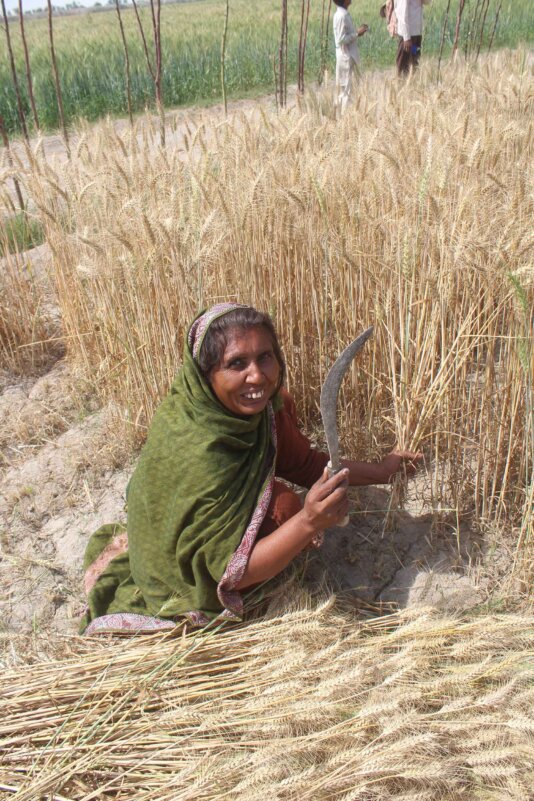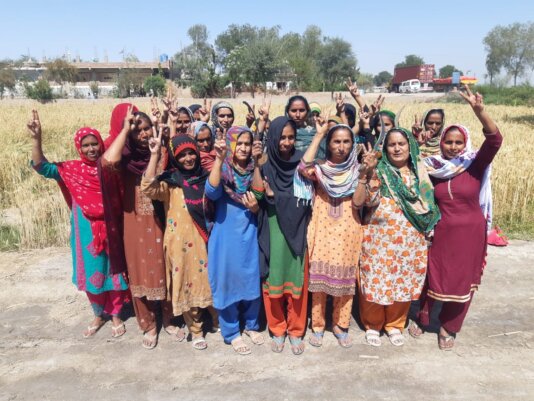- About
- Topics
- Story
- In-Depth
- Picks
- Opinion
- News
- Donate
- Signup for our newsletterOur Editors' Best Picks.Send
Read, Debate: Engage.
| March 11, 2024 | |
|---|---|
| topic: | Women's rights |
| tags: | #Pakistan, #women's rights, #agriculture, #Union rights |
| located: | Pakistan |
| by: | Zulfiqar Kunbhar |
Until last year, Naseem Mallah, an agricultural laborer in her 50s living in Buddo Majeedano, a farming village located in the Matiari district of Pakistan's southern Sindh province, had no inkling that the enduring culture of gender-neutral underpaid wages spanning decades would come to an end. Her peers were just as unaware. Equally unknown to them was the fact that unskilled agricultural laborers' unity would make this revolution possible - a step towards decent work.
It was in the summer of 2023 when the members of the Moomal Cotton Picking Mazdoor Union, a seven-year-old agricultural trade union led by Mallah, initiated a strike. They suspended cotton-picking activities for the standing crop in Buddo Majeedano to demand higher wages from the private employer they worked for, matching the government-fixed rates.
Mallah collaborated with labourers from other newly-formed agricultural trade unions in the area, ensuring a unified stance on wage demands across all employers.
As per the Sindh Labour Department, the minimum wage rate for unskilled adult and juvenile workers, both male and female, is set at PKR 32,000 per month or a minimum of PKR 1,230 per day.
Faced with no alternatives, employers in Buddo Majeedano gradually increased employees' wages during the last cotton harvesting season. In the final stages of harvesting, they paid them according to the government wage rate and agreed to continue this payment pattern in the future cropping seasons.
"Receiving increased wages as per our rights is like a dream come true, as it is directly linked with our financial empowerment. It impacts positively on our children's schooling, diet and other facilities," Mallah told FairPlanet.
She further mentioned that successful bargaining also led employers to agree on enhancing the traditional in-kind payment of employees' wheat compensation.
Saleem (name changed for privacy), a 57-year-old private agricultural employer in Matiari with 50 acres (20 hectares) of land, shared with FairPlanet that before last year, he paid laborers PKR 300 (USD 1.07) for picking 40 kilogrammes of cotton. This pay rate was consistent with the customary practice among private employers in the province.
"Last year, as cotton pickers declined to work at previous rates during harvesting season, it created a workforce shortage. The situation led me and other area growers to comply with employees' wage demands for the last year as well as for the future," Saleem said.
Pakistan's Industrial Relations Act of 2012, which facilitates unionisation for workers and employers, omits agricultural labourers. While this national legislation remains in effect, Sindh enacted a law in 2013 known as the Sindh Industrial Relations Act (SIRA) 2013, which extends inclusion to agricultural workers within the province.
Following Pakistan's 18th constitutional amendment in 2010, which grants legislative autonomy on provinces including in matters involving labour, agricultural trade unions in Sindh have been forming under the auspices of SIRA 2013, rather than the Industrial Relations Act of 2012.
Records from the Sindh Labor Department show that since the implementation of SIRA-2013, 11 agricultural trade unions have been registered in the province, with women leading seven of them. Of the total 407 labourers enrolled in these unions, 205 are women.
27 additional agricultural trade unions representing 1,125 labourers are currently in the registration process in Sindh, where women outnumber men. The recent surge in forming new agricultural trade unions in Sindh is attributed to international funding aimed at supporting local NGOs. These organisations assist labourers by offering guidance and technical assistance to establish unions.
"With the passage of time, the number of agricultural trade unions is increasing in Sindh, demonstrating the success of the benefits from existing unions," Samad Soomro, a senior official at the Sindh Labor Department, told FairPlanet.
He added that the emergence of agricultural trade unions in Sindh is transforming both the province and the country's agricultural landscape. This significant shift represents, in his view, a crucial step towards attaining decent work, in line with Sustainable Development Goal 8.
According to the 2022-23 Economic Survey by Pakistan's Ministry of Finance, the agriculture sector contributed 22.9 per cent to the country's Gross Domestic Product (GDP) and was responsible for generating 37.4 per cent of employment.
However, Pakistan has consistently scored low in terms of labour rights for an extended period.
For instance, according to the 2022 Labor Rights Index by the independent WageIndicator Foundation, Pakistan is rated as having "Basic Access to Decent Work," scoring 51. This places Pakistan in the second-to-last category out of a total of six categories.
Similarly, women, who comprised 67 per cent of total employment in Pakistan's agriculture sector in 2022, continue to face discrimination, according to a 2018 UN Women report.
"Women are concentrated in the agriculture sector, primarily in dairy and livestock," the report reads. "The returns to labor are low: only 19% are in paid employment and 60% work as unpaid workers on family farms and enterprises."
Of the 11 agricultural trade unions registered with the Sindh Labour Department, seven were established by the Sindh Community Foundation, a local NGO, in 2017. All of these seven unions, including the Moomal Cotton Picking Mazdoor Union, are led by women.
Javed Hussain, Executive Director of the Sindh Community Foundation and one of the major forces behind this growing trend of female leadership, explained that he appointed women leaders for various reasons.
"Decent work means fair pay, job security, social protection, personal development, freedom of expression and equal opportunities for all workers," he told FairPlanet. "Since women lag behind in achieving these conditions, they were encouraged into leadership roles due to vulnerability."
He added, "Another reason for the increased role of women in the leadership of our formed trade unions is that females constitute two-thirds of Pakistan’s total agriculture force, especially in manual cotton picking, where they make up about 90 per cent of the total workforce. Therefore, we believe the majority must prevail in leadership, as they are more vulnerable in challenging working conditions than men."
Hussain further mentioned that the most notable recent movement for agricultural workers' rights in Pakistan dates back to the 1940s, with a significant gap in serious movements since. However, he argues that the establishment of agricultural trade unions is cultivating a new culture among farm workers in Sindh, highlighting their long-overlooked rights. This development, he believes, serves as an exemplary model, not just for Pakistan but also internationally.
Hussain pointed out that the literacy rate among women in agriculture is extremely low, which leads to further discrimination in the form of lower wages compared to men and unfair deductions by employers exploiting their lack of education. Moreover, since women constitute the majority of cotton pickers, they face greater exposure to health risks such as chemical fertilisers and insect bites in the agricultural fields, he said.
The Sindh Human Rights Commission, a provincial government entity dedicated to safeguarding fundamental human rights, draws a connection between the higher presence of women in trade unions and recent legislation safeguarding their rights.
"The higher representation of women in agricultural trade unions in the province can also be attributed to the Sindh Women Agriculture Act 2019, a specific law designed to empower female farmers," Barrister Rida Tahir, a legal consultant at the Sindh Human Rights Commission, told FairPlanet. "This legislation focuses on aspects such as maternity benefits, social protection, provision of personal protective equipment and the reinforcement of women's trade unions."
However, she emphasised the importance of making agricultural trade unions gender-neutral in order to encourage the participation of both males and females.
Tahir further pointed out the issue of inadequate enforcement of minimum wage regulations, stating, "The widespread lack of implementation of the minimum wage exists due to the absence of framed rules in some related laws, as the law mandates rule-making."
Image by Zulfiqar Kunbhar.
By copying the embed code below, you agree to adhere to our republishing guidelines.



